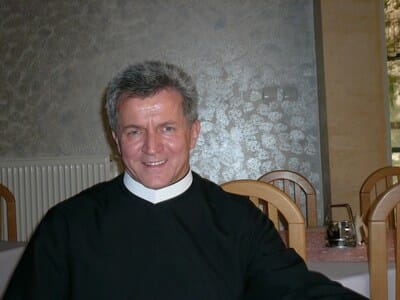
May 31, 2015 | Focolare Worldwide, Senza categoria
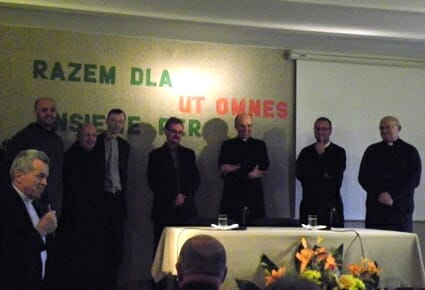 While visiting Poland, Maria Voce and Jesús Moran, President and Co-President of the Focolare Movement, respectively, held a meeting on 26 May in the Mariapolis Fiore (Poland) with a group of priests and religious who were bound in various ways to the Focolare. Fr. Zdzislaw Klafka, a Redemptorist, recounted his encounter with the spirituality of unity and the positive effects in living his specific vocation in a more radical manner. «I feel so grateful to Chiara Lubich for having been God’s docile tool in bringing about in the Church, a spirituality that has helped me face the difficulties in life: When I was nominated the Superior of my congregation, I found a challenge before me. I was in Rome and before returning to Poland, I asked her to suggest a phrase of the Gospel that could enlighten my path. She answered: “No one has greater love than he who gives up his life for his friends.” I was then 29 years old and that phrase became the compass that showed me the way. In living the spirituality of unity I started to look up to my founder, St. Alphonse, in a new way. This was how I rediscovered not only my roots but the evangelical force that lies within every other charism of the Church. Someone asked me whether my adhering to the spirituality of the Focolare was not time stolen from my duties as a Redemptorist. The fact is, and I have experienced it repeatedly, that when I return from my meetings with the religious of other orders, I feel the desire to live my own choice of God even more radically.»
While visiting Poland, Maria Voce and Jesús Moran, President and Co-President of the Focolare Movement, respectively, held a meeting on 26 May in the Mariapolis Fiore (Poland) with a group of priests and religious who were bound in various ways to the Focolare. Fr. Zdzislaw Klafka, a Redemptorist, recounted his encounter with the spirituality of unity and the positive effects in living his specific vocation in a more radical manner. «I feel so grateful to Chiara Lubich for having been God’s docile tool in bringing about in the Church, a spirituality that has helped me face the difficulties in life: When I was nominated the Superior of my congregation, I found a challenge before me. I was in Rome and before returning to Poland, I asked her to suggest a phrase of the Gospel that could enlighten my path. She answered: “No one has greater love than he who gives up his life for his friends.” I was then 29 years old and that phrase became the compass that showed me the way. In living the spirituality of unity I started to look up to my founder, St. Alphonse, in a new way. This was how I rediscovered not only my roots but the evangelical force that lies within every other charism of the Church. Someone asked me whether my adhering to the spirituality of the Focolare was not time stolen from my duties as a Redemptorist. The fact is, and I have experienced it repeatedly, that when I return from my meetings with the religious of other orders, I feel the desire to live my own choice of God even more radically.»

Fr. Zdzislaw Klafka
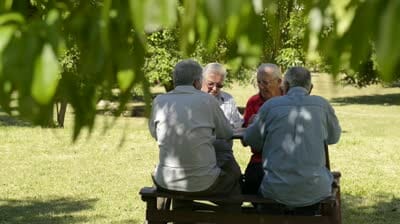
May 29, 2015 | Senza categoria
 “When I can, I attend a group for retirees in my neighbourhood. I see that certain people are avoided by the ‘decent’ folks in the group, because of their scruffy appearance: alcoholics, homeless, who bide the time with a bottle as their only companion, and no one tries to involve them in the games, or the conversation. So I began learning how to play cards and bocce, in order to be able to spend time with them without any judging. At first I had to put up with their frequent reprimands. But I made an effort anyway to be friendly and disposed towards them; also to accept their language and their ramshackle way of playing. One day, Giulio, whom everyone considered the biggest vagrant, was admitted to hospital because of an alcoholic problem, but no one which hospital he was in. I did some searching and made several phone calls, but because of privacy I wasn’t given any news. In the end, I contacted the city police and they were able to track him down. I took care of him. His doctor explained his medical condition to me if I were a relative. Then I took him home, obtained his medicines and some packages of food. Silvio, another alcoholic whose driver’s license had been removed, was about to lose his job. I stepped in to help him get it back. Now he’s out of his addiction and has become the animator of a group of Alcoholics Anonymous. Ulysses was a competitive player, and he bragged about being a “priest-hater”. For two years I put up with his rather aggressive statements. Then, he developed a tumour but, proud as he was, he wouldn’t accept help from anyone. One day he asked me to take him home. This unexpected request was like an answer for me, that perhaps I had made a breakthrough and conveyed a bit of my faith to him. Gianni, the youngest one in the group, was 50 years old. He was tall as a giant and lived a very disordered life. Because of his lifestyle he was considered last in the ‘good conduct’ rankings. I stood by him until the last day of his life. His family members were surprised, and so was he. A few days before his death he squeezed my hand inside that giant fist of his, expressing his esteem and gratitude. Guido is a deaf mute; the most isolated one in the group because communicating with him is very demanding. We’ve become friends, and now he’s my partner when we play trump. One day, Giulio, the homeless man, removed a picture of Saint Padre Pio from his pocket and, in front of the whole group, said to me: “For me, you’re another Saint Padre Pio*.” From that day on everyone in the circle began calling me by that name and, despite the fact that I found it embarrassing, the name stuck. These friends now await my arrival with joy and I often find myself playing cards with my deaf mute friend against the two alcoholics. We’ve become the most famous team in the circle, and also the noisiest! Before going to the circle, I make a visit in a nearby church – something that has not escaped the attention of the group – to ask Him for the strength and guidance in loving these socially disadvantaged friends of mine.” * Padre Pio of Pietrelcina is an Italian saint renowned for his miracles.
“When I can, I attend a group for retirees in my neighbourhood. I see that certain people are avoided by the ‘decent’ folks in the group, because of their scruffy appearance: alcoholics, homeless, who bide the time with a bottle as their only companion, and no one tries to involve them in the games, or the conversation. So I began learning how to play cards and bocce, in order to be able to spend time with them without any judging. At first I had to put up with their frequent reprimands. But I made an effort anyway to be friendly and disposed towards them; also to accept their language and their ramshackle way of playing. One day, Giulio, whom everyone considered the biggest vagrant, was admitted to hospital because of an alcoholic problem, but no one which hospital he was in. I did some searching and made several phone calls, but because of privacy I wasn’t given any news. In the end, I contacted the city police and they were able to track him down. I took care of him. His doctor explained his medical condition to me if I were a relative. Then I took him home, obtained his medicines and some packages of food. Silvio, another alcoholic whose driver’s license had been removed, was about to lose his job. I stepped in to help him get it back. Now he’s out of his addiction and has become the animator of a group of Alcoholics Anonymous. Ulysses was a competitive player, and he bragged about being a “priest-hater”. For two years I put up with his rather aggressive statements. Then, he developed a tumour but, proud as he was, he wouldn’t accept help from anyone. One day he asked me to take him home. This unexpected request was like an answer for me, that perhaps I had made a breakthrough and conveyed a bit of my faith to him. Gianni, the youngest one in the group, was 50 years old. He was tall as a giant and lived a very disordered life. Because of his lifestyle he was considered last in the ‘good conduct’ rankings. I stood by him until the last day of his life. His family members were surprised, and so was he. A few days before his death he squeezed my hand inside that giant fist of his, expressing his esteem and gratitude. Guido is a deaf mute; the most isolated one in the group because communicating with him is very demanding. We’ve become friends, and now he’s my partner when we play trump. One day, Giulio, the homeless man, removed a picture of Saint Padre Pio from his pocket and, in front of the whole group, said to me: “For me, you’re another Saint Padre Pio*.” From that day on everyone in the circle began calling me by that name and, despite the fact that I found it embarrassing, the name stuck. These friends now await my arrival with joy and I often find myself playing cards with my deaf mute friend against the two alcoholics. We’ve become the most famous team in the circle, and also the noisiest! Before going to the circle, I make a visit in a nearby church – something that has not escaped the attention of the group – to ask Him for the strength and guidance in loving these socially disadvantaged friends of mine.” * Padre Pio of Pietrelcina is an Italian saint renowned for his miracles.
![Dominican Republic: Dreaming of an Orchestra]()
May 20, 2015 | Focolare Worldwide, Senza categoria
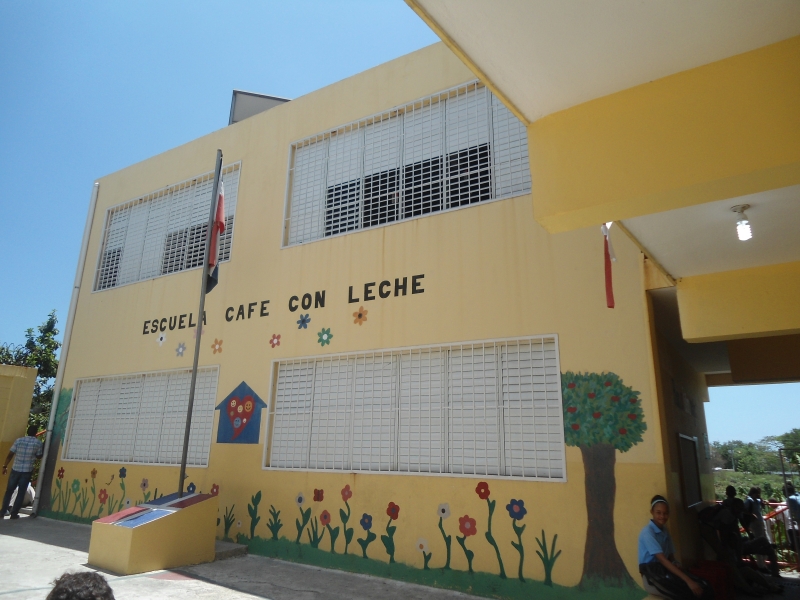 “I could go to the Dominican Republic and teach music for a couple weeks at Cafe’ con Leche School,” I nonchalantly expressed, not ever expecting that my comment would actually be taken seriously. So be it this unexpected trip turned into one of the most fantastic experiences I’ve ever had,” says Diane Gregory,former member of the Gen Verde Performing Arts Band, and who now lives in the United States. Before I knew it, I was on the plane heading for Santo Domingo. It was a chilly morning last April 9th. With snow still on the ground, I left New York’s JFK airport heading towards the Caribbean Island that welcomed me with its warm tropical climate and turquois sea. Along the drive to the colonial zone of the city where I would be staying, I was “taking in” everything, from the beautiful seashore with its coconut trees, to the automobiles, surprised at the number of people they can fit into those vehicles and, most strongly of all, I was being struck by the many impoverished neighborhoods that we passed along the way. The morning after I arrived I was on the Guaguita (a 9-seater van that I’ve seen holding up to 23 people!) with Kathi, a young German girl who is also volunteering at the school. Our stop was the town El Café. We were told of the violence that exists but also that we need not worry for our safety since it was “assumed” that we were there to help in the school. In fact, suffering, violence, unemployment and abandonment, are common amongst many of the families. Café con Leche, one of the many social projects of the Focolare Movement, amazes us with its warmth, liveliness, color and vibrancy. The classrooms are not like the ones I was used to in the US but more creative and just perfect for these 570 students from 1st – 8th grade. And to think that twenty years ago the school had begun in a wooden building with 20 students! Now, with the help of many people there is a school building and a gym that is able to welcome students providing them with a good education and nourishing daily meal – but not only. There is an atmosphere that is difficult to describe, a harmony of relationships that provides the students a very wholesome environment in which to study and grow.
“I could go to the Dominican Republic and teach music for a couple weeks at Cafe’ con Leche School,” I nonchalantly expressed, not ever expecting that my comment would actually be taken seriously. So be it this unexpected trip turned into one of the most fantastic experiences I’ve ever had,” says Diane Gregory,former member of the Gen Verde Performing Arts Band, and who now lives in the United States. Before I knew it, I was on the plane heading for Santo Domingo. It was a chilly morning last April 9th. With snow still on the ground, I left New York’s JFK airport heading towards the Caribbean Island that welcomed me with its warm tropical climate and turquois sea. Along the drive to the colonial zone of the city where I would be staying, I was “taking in” everything, from the beautiful seashore with its coconut trees, to the automobiles, surprised at the number of people they can fit into those vehicles and, most strongly of all, I was being struck by the many impoverished neighborhoods that we passed along the way. The morning after I arrived I was on the Guaguita (a 9-seater van that I’ve seen holding up to 23 people!) with Kathi, a young German girl who is also volunteering at the school. Our stop was the town El Café. We were told of the violence that exists but also that we need not worry for our safety since it was “assumed” that we were there to help in the school. In fact, suffering, violence, unemployment and abandonment, are common amongst many of the families. Café con Leche, one of the many social projects of the Focolare Movement, amazes us with its warmth, liveliness, color and vibrancy. The classrooms are not like the ones I was used to in the US but more creative and just perfect for these 570 students from 1st – 8th grade. And to think that twenty years ago the school had begun in a wooden building with 20 students! Now, with the help of many people there is a school building and a gym that is able to welcome students providing them with a good education and nourishing daily meal – but not only. There is an atmosphere that is difficult to describe, a harmony of relationships that provides the students a very wholesome environment in which to study and grow. 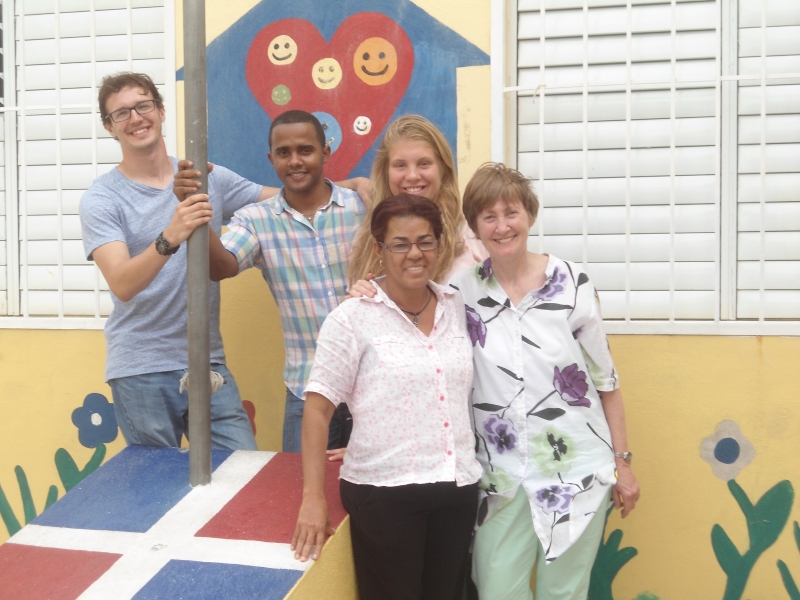 The 10 days that I spent at the school were extremely dynamic. Together with Marisol Jimenez, the founding director, there was a continual flourishing of ideas that we implemented immediately in the classrooms: saxophone and piano lessons; we formed a choir; did musical games and exercises, lessons on reading music; we made our own percussion instruments; put on skits; danced and even had macramé classes. Marisol’s dream is to have a school band. They had already received the instruments from Switzerland and the students are amazing with such a desire to learn (they have a natural rhythm and so much enthusiasm) but, unfortunately, they do not have the funds to hire music teachers on an ongoing basis. We hope that will happen soon! Café con leche is no longer a place that I’ve read about and heard so much about; it has become an “experience”. Now this school, the children, the teachers and everyone here have a name, a face, a story. I left convinced that everything is possible when we “catch the moment” and give it our all.
The 10 days that I spent at the school were extremely dynamic. Together with Marisol Jimenez, the founding director, there was a continual flourishing of ideas that we implemented immediately in the classrooms: saxophone and piano lessons; we formed a choir; did musical games and exercises, lessons on reading music; we made our own percussion instruments; put on skits; danced and even had macramé classes. Marisol’s dream is to have a school band. They had already received the instruments from Switzerland and the students are amazing with such a desire to learn (they have a natural rhythm and so much enthusiasm) but, unfortunately, they do not have the funds to hire music teachers on an ongoing basis. We hope that will happen soon! Café con leche is no longer a place that I’ve read about and heard so much about; it has become an “experience”. Now this school, the children, the teachers and everyone here have a name, a face, a story. I left convinced that everything is possible when we “catch the moment” and give it our all.
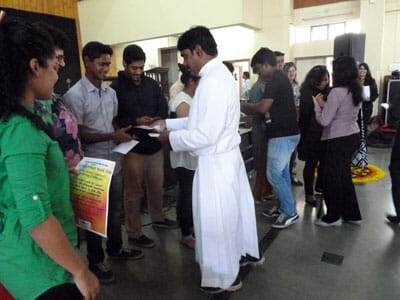
May 19, 2015 | Focolare Worldwide, Senza categoria
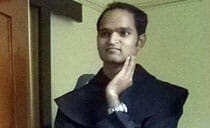 In India, a boom in vocations to consecrated life is seen in various points of the subcontinent: Andra Pradesh, Orissa, and the North Eastern States. “The sense of faith and vision of religious life is well esteemed and the youth feel the urge to enter the novitiate to cultivate their union with the Lord,” Fr Attulli states in an interview with Unità e Carismi (Unity and Charisms) of the Città Nuova editorial group. “They aspire this primarily with experience and prayer – he continued – and they wish to dedicate themselves more to the works of charity. The example of Mother Theresa of Calcutta is strong. From her concrete experience of India, she was able to discover herself and her own vocation, through a profound life of prayer from which her new vocation sprung.” The youth who enter the novitiate come from a part of society that is unable to hide social inequality and poverty, despite the fact that the Indian subcontinent is enumerated among the new world economies. But they have not lost their spiritual dimension, and on the other hand, “Look to God for the solution”. They have found at the same time a solution in social commitment, and in fact “draw inspiration from the works of charity in which they are involved, to solve the poverty in material needs, education, etc. They start with an experience of God, which leads them to undertake apostolic works for the needy.” The Catholic Church has called this the Year of Consecrated life. What should be done to make improvements? “Within the Indian setting, “Fr Attulli explained, “the Church in general and the religious in particular can bear witness to the presence of our Lord Jesus by taking greater care of the poor, in both their spiritual and concrete needs. It is a challenge in this secularized world where we are totally intoxicated with wellbeing! The people want to rediscover God in us, detaching themselves from this addiction to wellbeing.”
In India, a boom in vocations to consecrated life is seen in various points of the subcontinent: Andra Pradesh, Orissa, and the North Eastern States. “The sense of faith and vision of religious life is well esteemed and the youth feel the urge to enter the novitiate to cultivate their union with the Lord,” Fr Attulli states in an interview with Unità e Carismi (Unity and Charisms) of the Città Nuova editorial group. “They aspire this primarily with experience and prayer – he continued – and they wish to dedicate themselves more to the works of charity. The example of Mother Theresa of Calcutta is strong. From her concrete experience of India, she was able to discover herself and her own vocation, through a profound life of prayer from which her new vocation sprung.” The youth who enter the novitiate come from a part of society that is unable to hide social inequality and poverty, despite the fact that the Indian subcontinent is enumerated among the new world economies. But they have not lost their spiritual dimension, and on the other hand, “Look to God for the solution”. They have found at the same time a solution in social commitment, and in fact “draw inspiration from the works of charity in which they are involved, to solve the poverty in material needs, education, etc. They start with an experience of God, which leads them to undertake apostolic works for the needy.” The Catholic Church has called this the Year of Consecrated life. What should be done to make improvements? “Within the Indian setting, “Fr Attulli explained, “the Church in general and the religious in particular can bear witness to the presence of our Lord Jesus by taking greater care of the poor, in both their spiritual and concrete needs. It is a challenge in this secularized world where we are totally intoxicated with wellbeing! The people want to rediscover God in us, detaching themselves from this addiction to wellbeing.”  “Why do people stray from God? Why do they not feel the need to go towards Him? the religious asked himself. And the answer came from his own life experience. “If we stand by the poor and those in need, we discover God’s presence in them. The missionaries who live with the poor, come in contact with people who have faith, even if they need to be helped to grow in the “’culture of faith’, through catechism, prayers and the sacraments.” “In the Indian continent,” he concluded, “not only is there material poverty, but there are also existential peripheries. We are made for love and called to live a serene, peaceful and joyful life in love. Faith does not weigh on our minds, but is there to make us live with joy, not only in the life to come, but here and now. This is why our presence in the existential peripheries and with the poor is of great importance.”
“Why do people stray from God? Why do they not feel the need to go towards Him? the religious asked himself. And the answer came from his own life experience. “If we stand by the poor and those in need, we discover God’s presence in them. The missionaries who live with the poor, come in contact with people who have faith, even if they need to be helped to grow in the “’culture of faith’, through catechism, prayers and the sacraments.” “In the Indian continent,” he concluded, “not only is there material poverty, but there are also existential peripheries. We are made for love and called to live a serene, peaceful and joyful life in love. Faith does not weigh on our minds, but is there to make us live with joy, not only in the life to come, but here and now. This is why our presence in the existential peripheries and with the poor is of great importance.”
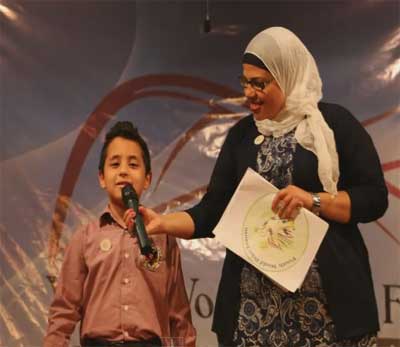
May 15, 2015 | Focolare Worldwide, Senza categoria
 “The Peace Forum was a unique experience. I enjoyed every moment of the programme. Such a meeting (. . .) makes one hope that better days are coming and that one day poverty, hunger discrimination and violence will see their end.” This is how Rasha, an English teacher at Rowad American College, describes Living Peace 2015 which was held in Cairo on May 4-6, 2015, following a three-day congress in Alexandria, Egypt that provided the young people with the necessary background knowledge. In Alexandria there were moments of sharing and mutual understanding, sharing the joys and sorrows that they brought with them from their own countries. In Cairo, there was a beautiful welcome, with festivities along the Nile on a large boat, with games, dancing and song. Then came the actual World Forum of Students for Peace. The project was promoted by New Humanity, an NGO, through the Cayrus project approved by the European Union. Various partners and sponsors from different countries adhered to the project and sent youth representatives to Egypt. For three days 1300 students and professors from more than 20 schools and 8 Egyptian universities shared testimonies of their common commitment to peace: best practices, more than 50 educational projects for peace, workshops, seminars, exhibits and artistic performances. Also present were ambassadors and diplomatic representatives from Argentina, Brazil, Uruguay, Guatemala, Cuba, Democratic Republic of Congo, Cameroon, Pakistan, Portugal, Croatia, Mexico, Germany and Sudan. Begun in 2011 by an English teacher at El Rowad American College of Cairo, as an educational project for peace, today, Living Peace involves more than 2500 students from around the world. A main feature of the project is the way it directly engages the students and teachers in the creation of an educational peace initiative, involving a global network of people and institutions. Membership in the project enables each school to develop projects in accordance with their own possibilities, favouring the creativity of the students along with the awareness that they are contributing towards a common goal. This creates a dynamic of participation that motivates the different components of the school, reinforcing solidarity amongst students, teachers, directors and families, with repercussions in civil society. The 2015 Forum was the occasion for presenting Scholas Occurrentes, the large global network that the Pope wished to see when he was still archbishop of Buenos Aires, and that now connects more than 400,0000 schools around the world. The presence of Dominicus Rohde from Germany, President of the World Peace Forum, raised the tone of the events. Since it was the first world forum held by young people, it opened the doors to a new road. The worldwide forum on peace has awarded the Luxemburg Peace Prize to New Humanity. The prestigious Nelson Mandela Medal was consigned to Cecilia Landucci who represented the NGO in Cairo. See video: Living Peace 2015 https://www.youtube.com/watch?v=nugDbxgoccg&feature=youtu.be Source: ONG New Humanity, AMU e Umanità Nuova. Updated May 27, 2015
“The Peace Forum was a unique experience. I enjoyed every moment of the programme. Such a meeting (. . .) makes one hope that better days are coming and that one day poverty, hunger discrimination and violence will see their end.” This is how Rasha, an English teacher at Rowad American College, describes Living Peace 2015 which was held in Cairo on May 4-6, 2015, following a three-day congress in Alexandria, Egypt that provided the young people with the necessary background knowledge. In Alexandria there were moments of sharing and mutual understanding, sharing the joys and sorrows that they brought with them from their own countries. In Cairo, there was a beautiful welcome, with festivities along the Nile on a large boat, with games, dancing and song. Then came the actual World Forum of Students for Peace. The project was promoted by New Humanity, an NGO, through the Cayrus project approved by the European Union. Various partners and sponsors from different countries adhered to the project and sent youth representatives to Egypt. For three days 1300 students and professors from more than 20 schools and 8 Egyptian universities shared testimonies of their common commitment to peace: best practices, more than 50 educational projects for peace, workshops, seminars, exhibits and artistic performances. Also present were ambassadors and diplomatic representatives from Argentina, Brazil, Uruguay, Guatemala, Cuba, Democratic Republic of Congo, Cameroon, Pakistan, Portugal, Croatia, Mexico, Germany and Sudan. Begun in 2011 by an English teacher at El Rowad American College of Cairo, as an educational project for peace, today, Living Peace involves more than 2500 students from around the world. A main feature of the project is the way it directly engages the students and teachers in the creation of an educational peace initiative, involving a global network of people and institutions. Membership in the project enables each school to develop projects in accordance with their own possibilities, favouring the creativity of the students along with the awareness that they are contributing towards a common goal. This creates a dynamic of participation that motivates the different components of the school, reinforcing solidarity amongst students, teachers, directors and families, with repercussions in civil society. The 2015 Forum was the occasion for presenting Scholas Occurrentes, the large global network that the Pope wished to see when he was still archbishop of Buenos Aires, and that now connects more than 400,0000 schools around the world. The presence of Dominicus Rohde from Germany, President of the World Peace Forum, raised the tone of the events. Since it was the first world forum held by young people, it opened the doors to a new road. The worldwide forum on peace has awarded the Luxemburg Peace Prize to New Humanity. The prestigious Nelson Mandela Medal was consigned to Cecilia Landucci who represented the NGO in Cairo. See video: Living Peace 2015 https://www.youtube.com/watch?v=nugDbxgoccg&feature=youtu.be Source: ONG New Humanity, AMU e Umanità Nuova. Updated May 27, 2015
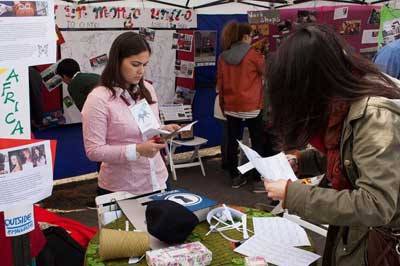
May 9, 2015 | Focolare Worldwide, Senza categoria
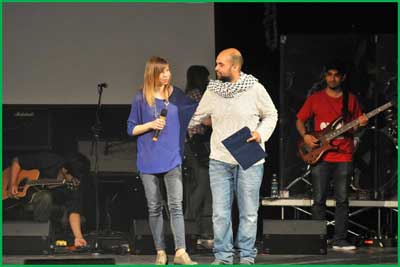 “During these hours in which we are literally bombarded with violence, war, and indifference, we wish to powerfully testify that there is another way, because there is!” This was the introduction that came from the stage of the Auditorium of Loppiano, Italy where Nino, Nahomi, Luigi and Anna had held a two hour long discussion with 1,400 young people. The 42cnd Meeting of young Italians of the Focolare was held on the 1st of May in the permanent Mariapolis of Loppiano, Italy. This year’s title was: OUTSIDE, Look, Choose, Be.” Many proposals were presented by the Young For A United World in support of a culture of fraternity, as a way of emerging from personal and social inertia and bring change to the world. Their “Fragments of Unity” Expo highlighted solidarity and social involvement, through a network of organisations which the young people run. One powerful testimony: “My name is Kareem. I’m Palestinian. I’m 23 years old with a degree in Administration. After the fall of Arafat’s government things began to be difficult for us Christians on the Garza Strip. At that time there were around 2000 of us out of a population of one and a half million. Then our numbers dwindled. Two churches were bombed. The war began in 2008. One day, a bomb exploded near me, and I was thrown to the ground. So much destruction, so many dead! I first tried to go to my father at the United Nations office because it seemed a safe place, but it wasn’t possible. It took me four hours to reach my home, having to walk over many dead bodies. My mother was in tears, because she hadn’t heard from me. We lived through 28 days of that constant tension. Then we managed to leave the Garza Strip and get into Jordan. With the people from the Focolare, experiencing such a life of fraternity, I was little by little able to overcome the powerful trauma and to believe that with love we could build a world of peace. I’ve been in Loppiano for seven months. Living with young people from so many different cultures, religions and experiences is something new for me, because we didn’t have any outside contacts in Gaza. But now, as I try to open myself and be accepting of others, I feel at home; I’ve discovered the treasure I’ve been searching for.”
“During these hours in which we are literally bombarded with violence, war, and indifference, we wish to powerfully testify that there is another way, because there is!” This was the introduction that came from the stage of the Auditorium of Loppiano, Italy where Nino, Nahomi, Luigi and Anna had held a two hour long discussion with 1,400 young people. The 42cnd Meeting of young Italians of the Focolare was held on the 1st of May in the permanent Mariapolis of Loppiano, Italy. This year’s title was: OUTSIDE, Look, Choose, Be.” Many proposals were presented by the Young For A United World in support of a culture of fraternity, as a way of emerging from personal and social inertia and bring change to the world. Their “Fragments of Unity” Expo highlighted solidarity and social involvement, through a network of organisations which the young people run. One powerful testimony: “My name is Kareem. I’m Palestinian. I’m 23 years old with a degree in Administration. After the fall of Arafat’s government things began to be difficult for us Christians on the Garza Strip. At that time there were around 2000 of us out of a population of one and a half million. Then our numbers dwindled. Two churches were bombed. The war began in 2008. One day, a bomb exploded near me, and I was thrown to the ground. So much destruction, so many dead! I first tried to go to my father at the United Nations office because it seemed a safe place, but it wasn’t possible. It took me four hours to reach my home, having to walk over many dead bodies. My mother was in tears, because she hadn’t heard from me. We lived through 28 days of that constant tension. Then we managed to leave the Garza Strip and get into Jordan. With the people from the Focolare, experiencing such a life of fraternity, I was little by little able to overcome the powerful trauma and to believe that with love we could build a world of peace. I’ve been in Loppiano for seven months. Living with young people from so many different cultures, religions and experiences is something new for me, because we didn’t have any outside contacts in Gaza. But now, as I try to open myself and be accepting of others, I feel at home; I’ve discovered the treasure I’ve been searching for.”  “After the 2010 earthquake in Haiti which caused the death of more than 220 thousand people, thousands of Haitians migrated to Brazil,” says Joao from Florianopolis, in south Brazil. “Many of them have university degrees but, since they don’t speak Portuguese, they are only able to find work as bricklayers, and are often paid very little and treated with scorn. We asked ourselves what could be done. We began by gathering clothing and foodstuffs. We felt a bit awkward, because they only spoke French and Creole, and we were unfamiliar with their culture. But our strong desire to practice the Gospel sentence: “I was a stranger and you welcomed me,” overcame all the obstacles. Little by little we got to know them and also their problems. The first was language. We began offering them Portuguese lessons with slides and music. Then we helped them to obtain their documents and enrol in free technical training courses that are offered by the government, so that they could find employment and a better life. We held cultural nights, with food, song and dance from their country. We went to the seashore and played football together. . . We have begun to build an association to take advantage of all the possible opportunities offered by institutions in favour of their full insertion into local society. Not everything has been worked out and we still have a lot of work ahead of us, but it seems that a seed of fraternity has been planted.” This has been a glimpse of the 2015 Meeting, rich with testimonies and many concrete proposals for responding to the urgent needs of many people. Meanwhile, a network of young people, associations, and organisations has already been very active for several years in Italy, operating at many levels of the social fabric, in what Pope Francis has called the existential peripheries: “We want to bring into the light this undergrowth of solidarity that is building a present and future of peace, but is not well enough known,” the young people from the Focolare explain.
“After the 2010 earthquake in Haiti which caused the death of more than 220 thousand people, thousands of Haitians migrated to Brazil,” says Joao from Florianopolis, in south Brazil. “Many of them have university degrees but, since they don’t speak Portuguese, they are only able to find work as bricklayers, and are often paid very little and treated with scorn. We asked ourselves what could be done. We began by gathering clothing and foodstuffs. We felt a bit awkward, because they only spoke French and Creole, and we were unfamiliar with their culture. But our strong desire to practice the Gospel sentence: “I was a stranger and you welcomed me,” overcame all the obstacles. Little by little we got to know them and also their problems. The first was language. We began offering them Portuguese lessons with slides and music. Then we helped them to obtain their documents and enrol in free technical training courses that are offered by the government, so that they could find employment and a better life. We held cultural nights, with food, song and dance from their country. We went to the seashore and played football together. . . We have begun to build an association to take advantage of all the possible opportunities offered by institutions in favour of their full insertion into local society. Not everything has been worked out and we still have a lot of work ahead of us, but it seems that a seed of fraternity has been planted.” This has been a glimpse of the 2015 Meeting, rich with testimonies and many concrete proposals for responding to the urgent needs of many people. Meanwhile, a network of young people, associations, and organisations has already been very active for several years in Italy, operating at many levels of the social fabric, in what Pope Francis has called the existential peripheries: “We want to bring into the light this undergrowth of solidarity that is building a present and future of peace, but is not well enough known,” the young people from the Focolare explain.

 While visiting Poland, Maria Voce and Jesús Moran, President and Co-President of the Focolare Movement, respectively, held a meeting on 26 May in the Mariapolis Fiore (Poland) with a group of priests and religious who were bound in various ways to the Focolare. Fr. Zdzislaw Klafka, a Redemptorist, recounted his encounter with the spirituality of unity and the positive effects in living his specific vocation in a more radical manner. «I feel so grateful to Chiara Lubich for having been God’s docile tool in bringing about in the Church, a spirituality that has helped me face the difficulties in life: When I was nominated the Superior of my congregation, I found a challenge before me. I was in Rome and before returning to Poland, I asked her to suggest a phrase of the Gospel that could enlighten my path. She answered: “No one has greater love than he who gives up his life for his friends.” I was then 29 years old and that phrase became the compass that showed me the way. In living the spirituality of unity I started to look up to my founder, St. Alphonse, in a new way. This was how I rediscovered not only my roots but the evangelical force that lies within every other charism of the Church. Someone asked me whether my adhering to the spirituality of the Focolare was not time stolen from my duties as a Redemptorist. The fact is, and I have experienced it repeatedly, that when I return from my meetings with the religious of other orders, I feel the desire to live my own choice of God even more radically.»
While visiting Poland, Maria Voce and Jesús Moran, President and Co-President of the Focolare Movement, respectively, held a meeting on 26 May in the Mariapolis Fiore (Poland) with a group of priests and religious who were bound in various ways to the Focolare. Fr. Zdzislaw Klafka, a Redemptorist, recounted his encounter with the spirituality of unity and the positive effects in living his specific vocation in a more radical manner. «I feel so grateful to Chiara Lubich for having been God’s docile tool in bringing about in the Church, a spirituality that has helped me face the difficulties in life: When I was nominated the Superior of my congregation, I found a challenge before me. I was in Rome and before returning to Poland, I asked her to suggest a phrase of the Gospel that could enlighten my path. She answered: “No one has greater love than he who gives up his life for his friends.” I was then 29 years old and that phrase became the compass that showed me the way. In living the spirituality of unity I started to look up to my founder, St. Alphonse, in a new way. This was how I rediscovered not only my roots but the evangelical force that lies within every other charism of the Church. Someone asked me whether my adhering to the spirituality of the Focolare was not time stolen from my duties as a Redemptorist. The fact is, and I have experienced it repeatedly, that when I return from my meetings with the religious of other orders, I feel the desire to live my own choice of God even more radically.» 





 “During these hours in which we are literally bombarded with violence, war, and indifference, we wish to powerfully testify that there is another way, because there is!” This was the introduction that came from the stage of the Auditorium of
“During these hours in which we are literally bombarded with violence, war, and indifference, we wish to powerfully testify that there is another way, because there is!” This was the introduction that came from the stage of the Auditorium of